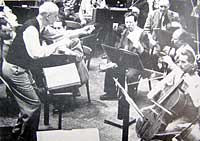The ears /brain know not much about music, the heart/body know more...
Music is a social integration of all individuals in some rythmic union with Nature... Language comes from music in this sense...
Furtwangler know that because his direction infaillibly express this eternal TEMPO flying over all smaller one beat in any musical work he ever directed...
Alain Connes Fields medal in mathematics just registered a sequence of the imprevisible beat of the creation manifested through the prime numbers distributions...
Time obey music not the reverse...Connes say studying Hilbert spaces that the source of an irrepressible flows of variations and novelty richer than time and at the source of time is this BEAT related to the prime distribution...
Why do you think american Indian and pygmys dance to call for the rain?
Superstition or higher consciousness ?
Guess what is the right answer... 😁😊
Furtwangler music call for the soul like some call for the rain, it is the same UNIVERSAL beat for the rain and the soul......
«My soul flow with the rain»-Anonymus poet
«There is only one beat for love and it is the right one each time »-Anonymus poet
«Musical discourse is infallible all around the earth, be it european or a pygmies dance , because music is God speak at the origin of language itself» -Anonymus poet
Thanks to the work in non commutative geometry of alain Connes we can guess now how music and numbers can be related to God spoken language...
thanks to pygmies or Furtwangler we can feel it without studying mathematics... 😁😊


 The first, a structural logic, sense of proportion and intellectual probing, was derived from Furtwängler’s upbringing and is clearly evident in his early Polydors. The second – unbridled emotion and improvisation – was forged in the hideous caldron of Nazi Germany.
The first, a structural logic, sense of proportion and intellectual probing, was derived from Furtwängler’s upbringing and is clearly evident in his early Polydors. The second – unbridled emotion and improvisation – was forged in the hideous caldron of Nazi Germany.